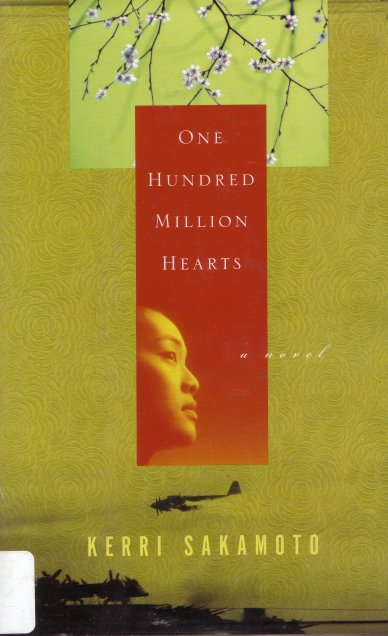
100 Million Hearts

This is a fiction book. The more you know about Japanese history dealing with the reasons for World War II and the thinking behind the fighting, the more you will appreciate this novel.
The book is about Miyo, who is 32 and physically disabled. She is a Japanese Canadian. Her father was a soldier in Manchuko, which where the Japanese set up their own puppet-state in China prior to World War II.
Other major characters include Miyo's father, Setsuko, and Hana.
We find out that Miyo's mother died during childbirth, and that her father has some dark secret relating to his actions as a soldier during the war.
Miyo falls getting off a train helped by a human resources worker named David. One thing leads to another and they end up falling in love.
Later, Miyo's father becomes ill. He leaves a dying message for her: “endure the unendurable.Just after Miyo's father dies, Setsuko reveals that she is really married to him. He also leaves a strange message for Setsuko: “I did not disgrace them....I don't want to die but I will.
Miyo also finds out that her father and Setsuko had a child together, a girl named Hana. After her father dies she and Setsuko go to Japan to meet Hanako.
The rest of the book deals with Miyo's visit to Japan and the Yasakuni shrine
Miyo and Setsuko go to the Yasukuni shrine, and Setsuko has Miyo's father's ashes with her. The rest of the book deals with relationships between a variety of people including Miyo and her sister, a museum at the shrine, Hiroshima and the Emperor's surrender broadcast, and other topics.
This is an extremely good book. It covers a lot of the most important things about World War II and Japan; the characters are well done, the relationships interesting, the whole novel is just plan a winner.
The one flaw the book has is in its indeterminate timeline. You don't know exactly when the events are taking place; probably in the 1990's, but there's no specific reference to a timeline. You don't even know the season the events are taking place. These two things will annoy some readers and might cause confusion for some readers who try to figure out what happened when, since the "when" is not really pinpointed.
There are a variety of other things that come up in the book that refer to the times:
The Yasakuni shrine: Go here for my material on this.
Emperor Worship. This involved believing that the Emperor was actually a diety, and having a willingness to die for him.
The tokkotai; the kamikaze. My material on this is here.
The hibakusha. These are the survivors of the atomic bombing of Hiroshima and Nagasaki who ended up massively physically scarred. They were actually shunned by other Japanese after the war.
The internment camps for persons of Japanese ancestry. My material on this is here. I have a book review about the Japanese Canadian camps, but otherwise my information is on American camps.
The “Yamato spirit.This was the belief among the Japanese that the spirit of the people of Japan would cause Japan to triumph in the war, even when they were physically losing the war.
The concept of pure Japanese. This is where those who are born and stay in Japan sometimes look down on a Japanese who is born elsewhere then moves to Japan, or goes and studies overseas and then returns.
Main Index
Japan main page
Japanese-American Internment Camps index page
Japan and World War II index page
|